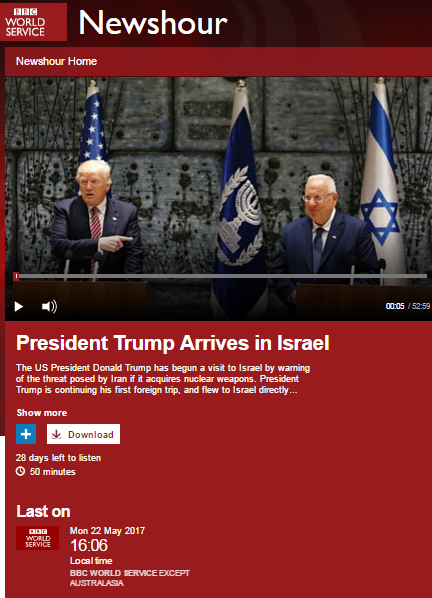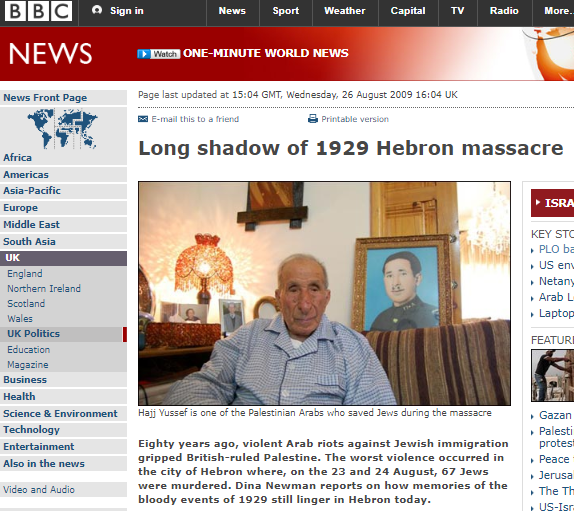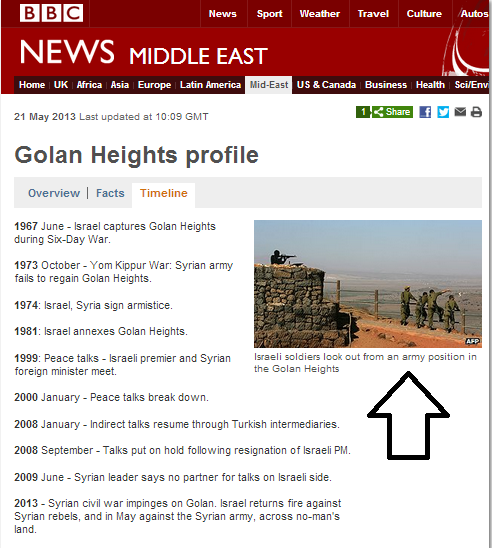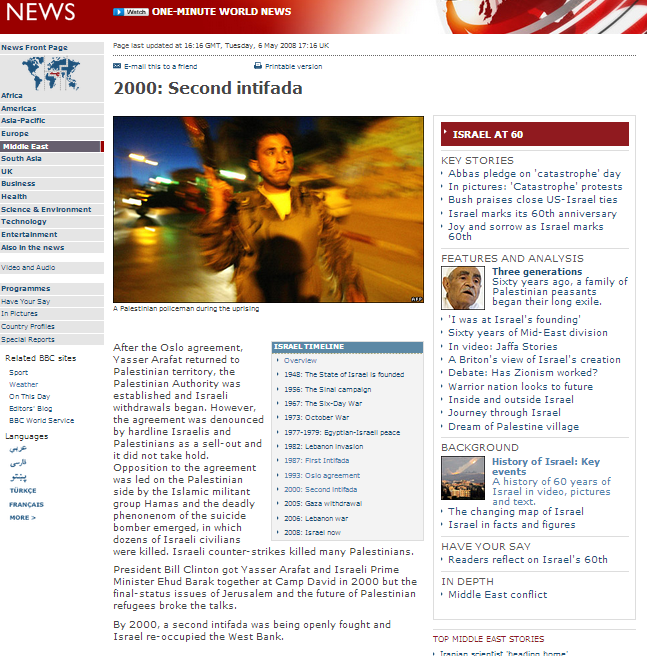As was noted here in an earlier post, the lead story in the May 22nd afternoon edition of the BBC World Service radio programme ‘Newshour‘ concerned the US president’s visit to Israel.
In addition to repeated promotion of the ‘apartheid’ calumny, in the first of two items relating to that story listeners had heard BBC Jerusalem correspondent Tom Bateman telling them that the Israeli government ‘says’ that Iran arms Hizballah.
Razia Iqbal: “You mentioned Iran and there was some criticism of Iran when the president was in Saudi Arabia and he has underlined that criticism again today in Israel hasn’t he?”
Tom Bateman: That’s right and, you know, I don’t think that’s going to be the last of it and of course it’s a message that resonates with Israel because Israel’s government is extremely concerned about Iran. They believe that…ah…because of its action, that they say it’s arming Hizballah just north of Israel here in Syria [sic], that that brings an even greater threat – in fact its greatest threat in the form of Hizballah just over its border in Lebanon.” [emphasis added]
As was noted in our previous post:
“One would of course expect a BBC correspondent based in Jerusalem – new or not – to be capable of informing BBC audiences that Iranian financial and military support for Hizballah (in violation of UNSC resolution 1701) is not just something that the Israeli government ‘says’ but a fact about which Hizballah has been open and at least one Iranian official has admitted.”
Later on in the same programme’s second item on that story (from 45:05 here) presenter Razia Iqbal returned to the topic of Iran in a conversation with the BBC’s chief international correspondent Lyse Doucet.
Listeners learned nothing from that conversation about the Iranian regime’s policy of supporting and enabling terror groups in the region and the real reasons why some Middle East countries have long viewed the Iranian regime as a threat to regional stability were not conveyed to BBC audiences. What they did hear, however, is a portrayal of the subject that would doubtless have gone down very well in Tehran. [emphasis in italics in the original, emphasis in bold added]
Razia Iqbal: “Let’s return to our top story now; the second leg of President Trump’s visit to the Middle East. Today he is in Israel and the Palestinian territories. We’re joined now from Jerusalem by Newshour’s Lyse Doucet. Ah…Lyse: you were in Saudi Arabia following President Trump there and Prime Minister Netanyahu spoke directly about the fact that the president flew from Riyad to Tel Aviv and though there were no diplomatic relations between Saudi Arabia and Israel. I wonder if there is a sense here that the Gulf states are making common cause with Israel in the context of their mutual fear of Iran?”
Doucet: “Yes, it’s very interesting isn’t it? This little diplomatic milestone: President Trump flying for the first time on this first direct flight. In fact Prime Minister Netanyahu said he looks forward to the day when an Israeli prime minister can fly from Tel Aviv to Riyad. And I think it’s a story that doesn’t get enough attention; that there have been behind the scene, very discreet meetings between Israelis and Saudis. Very senior Saudis have come to Israel before because they do want to make common cause.”
Of course one of the media outlets not giving “enough attention” to that story is the BBC itself. Doucet continued:
“You’ve mentioned one of the biggest reasons to do so and that is their shared animosity towards Iran. That was one of the main issues in the centrepiece speech that President Trump delivered to a gathering of some 40 Arab and…leaders from the Arab and Islamic world. Not just the fight against extremism but a fight against Iran and he’s brought that message here. He spoke of…he said I’ve come from the Arab world with the common understanding that is shared by you that Iran is the main threat. So things are definitely shifting.”
Of course “things” actually ‘shifted’ quite some time ago – as Gulf state reactions to the 2015 P5+1 deal with Iran concerning its nuclear programme indicated – but neither Iqbal nor Doucet (who has written about that topic in the past) bothered to remind listeners of that.
Iqbal: “It’s interesting to hear you say they’re shifting because of course Iran on the ground in Iraq and in…in…certainly in Iraq is doing quite a lot to fight against the Islamic State group. So one wonders about these tectonic shifts, if you like, and how they’ll manifest itself [sic] given that President Trump is really keen to make inroads with eliminating Islamic State.”
Doucet: “Yes, and welcome, President Trump, to the Middle East. At some point we may hear him say – as he said about the Affordable Care Act in the United States; Obamacare, – I didn’t realise that it was so complicated. As you know, take Syria that you just mentioned [sic] – he wants to push back Iran; that is the Saudis’ main goal. But interestingly, President Trump did not mention Russia in his speech in Riyad. And arguably Russia and Iran are working together, first to bolster President Assad but also to fight against so-called Islamic State and at the same time to push back some of the forces which have been trained and financed by the United States.
And what the Iranians would say is that they are in Syria because they’ve been asked to be there. They’re in Iraq because they’ve been asked to be there and they see no reason why they should leave. I think there’s growing concern about what will come next at a time when Iranians have shown that in the re-election of Hassan Rouhani, they want an engagement with the wider world. The message from Riyad – and it will be the message as well from Jerusalem – is that their enemies want to isolate them in the world.”
Iqbal: “Just, Lyse, very briefly; his next trip is to the Palestinian territories?”
Doucet: “Yes. The Palestinians have been surprised. They thought that President Trump would be only focusing on Israeli interests and Israeli views but his ear has been bent by King Abdallah of Jordan, by the Palestinian president Mahmoud Abbas and this is why we’re not going to see the announcement of a move of the American embassy to Jerusalem. He is trying to be a friend of Israel and a friend of the Palestinians.”
Doucet offers no factual evidence for that extraordinary claim.
For years BBC journalists – and not least Lyse Doucet and Razia Iqbal in person – have been playing down the Iranian regime’s regional aggression and patronage of terrorism and the corporation has also repeatedly propagated the myth of ‘moderates’ within the Iranian regime.
If BBC audiences are to understand why Israel may have common interests relating to Iran with some of its neighbours in the Middle East, then clearly they need to be provided with a factually accurate and comprehensive portrayal of the Iranian regime’s policies, positions and activities rather than whitewashed, vacuous and unhelpful commentary of the type broadcast to millions worldwide in this item.
Related Articles:
No wonder BBC WS presenter Razia Iqbal got Iranian threat to Israel wrong
BBC ECU upholds complaint concerning Iranian threats to Israel
BBC’s summary of Khamenei speech censors pledge to support terror
BBC WS Newshour promotes ‘apartheid’ smear in Trump visit coverage




